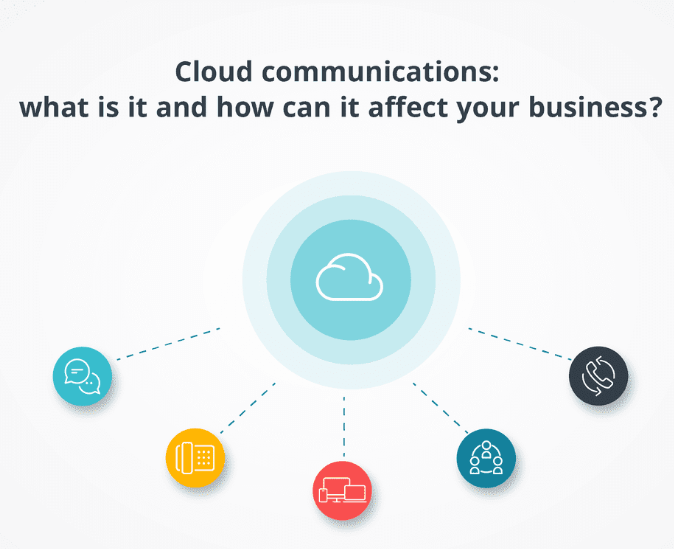Cloud technology has revolutionized how businesses operate, and one of its most impactful applications is in cloud communications. As organizations move away from traditional telephony and on-premises systems, cloud-based communication solutions offer a more flexible, scalable, and cost-effective way to stay connected. This article delves into the essentials of cloud communications, exploring what it is, how it benefits businesses, and the key trends shaping its future.
What is Cloud Communication?
Cloud communication refers to any form of communication that takes place over an internet-based platform rather than through traditional phone lines or physical infrastructure. It leverages the cloud to deliver voice, video, messaging, and other communication services. In essence, it moves all communication channels—phone calls, video meetings, emails, and instant messages—to a cloud-based environment, allowing for easy access, management, and scalability.
The Core Components of Cloud Communications
Cloud communications typically include:
- VoIP (Voice over Internet Protocol) – Enables voice calls over the internet.
- Unified Communications as a Service (UCaaS) – Combines multiple communication tools such as messaging, voice, and video into a single platform.
- CPaaS (Communications Platform as a Service) – Provides a customizable platform for businesses to add communication capabilities like SMS, chat, and video into their own applications.
- Contact Center as a Service (CCaaS) – Cloud-based solution for managing customer service interactions through multiple channels like voice, chat, and email.
How Does Cloud Communication Work?
Unlike traditional systems that require physical servers, wiring, and extensive infrastructure, cloud communication services are hosted on remote servers managed by third-party providers. These providers handle everything from maintenance to upgrades, allowing businesses to focus on using the technology without worrying about the technical complexities.
Communication data is transmitted over the internet, encrypted for security, and stored on the cloud. This means that employees can access communication tools from anywhere, using any device, as long as they have an internet connection.
Key Benefits of Cloud Communications
1. Cost Efficiency
One of the biggest advantages of cloud communications is its cost efficiency. Traditional phone systems involve significant capital expenditure on hardware, maintenance, and upgrades. In contrast, cloud communication systems operate on a subscription model, reducing upfront costs and allowing businesses to pay only for the services they use.
2. Scalability
Cloud communication solutions are highly scalable, making them ideal for growing businesses. Whether you’re adding new users, expanding into new locations, or scaling back during off-peak seasons, adjusting your communication capacity is as simple as a few clicks.
3. Flexibility and Mobility
With cloud communication, employees can make calls, join meetings, and collaborate from anywhere in the world. This flexibility is crucial for remote teams and businesses with multiple locations. It allows employees to use a variety of devices—smartphones, tablets, laptops—ensuring they’re always connected.
4. Advanced Features and Integration
Cloud-based communication platforms come packed with features such as video conferencing, instant messaging, virtual assistants, and CRM integration. These features streamline business processes, improve team collaboration, and enhance the overall customer experience.
5. Disaster Recovery and Business Continuity
Because cloud communication data is stored in secure, redundant data centers, businesses are protected from data loss due to hardware failure or natural disasters. In the event of an emergency, employees can continue working from different locations without any loss of service.
6. Enhanced Security
Cloud providers invest heavily in security, offering features such as data encryption, secure access controls, and regular security updates. This ensures that your communications are secure from unauthorized access and cyber threats.
Key Components of a Cloud Communication System
To understand cloud communications better, it’s essential to know the components that make up a typical system:
1. Unified Communications (UC)
Unified communications integrate multiple communication methods—voice, video, messaging—into a single platform. UC is designed to simplify internal and external communication, offering features like presence information, video calling, and team collaboration tools.
2. VoIP (Voice over Internet Protocol)
VoIP technology allows businesses to make voice calls over the internet instead of traditional phone lines. This offers cost savings and flexibility, as users can make calls from any device with an internet connection.
3. Video Conferencing Tools
Cloud-based video conferencing tools like Zoom, Microsoft Teams, and Google Meet are essential for virtual meetings, remote work, and team collaboration. They enable real-time video communication, screen sharing, and recording, making them indispensable for modern businesses.
4. Messaging and Collaboration Apps
Messaging apps such as Slack and Microsoft Teams facilitate instant communication and collaboration, allowing teams to share files, create project channels, and communicate in real time.
5. Contact Centers
Cloud contact centers use cloud communication technology to manage customer interactions through voice, chat, email, and social media. This ensures a seamless customer experience and provides businesses with valuable insights through analytics and reporting.
Cloud Communication Solutions for Different Business Needs
Cloud communication solutions are not one-size-fits-all. Depending on the size, industry, and specific needs of a business, there are different types of solutions to consider:
1. For Small Businesses
Small businesses benefit from cloud communication systems because they offer enterprise-grade features without the hefty price tag. VoIP services and UCaaS platforms provide affordable solutions that are easy to set up and manage.
2. For Medium-Sized Enterprises
Medium-sized businesses often require more robust features such as advanced call routing, video conferencing, and CRM integration. UCaaS platforms and cloud contact center solutions offer the flexibility and scalability needed to support business growth.
3. For Large Enterprises
Large enterprises often look for fully integrated solutions that support thousands of employees across multiple locations. CPaaS platforms allow large organizations to build custom communication solutions tailored to their specific needs.
4. For Remote and Hybrid Workforces
Cloud communication tools are a perfect fit for companies with remote or hybrid teams. With features like mobile apps, video conferencing, and instant messaging, employees can stay connected and productive from anywhere.
Challenges of Cloud Communications
While cloud communication offers numerous benefits, it’s not without its challenges:
1. Dependence on Internet Connectivity
Cloud communication relies heavily on a stable internet connection. Poor connectivity can lead to dropped calls, video buffering, and other issues that disrupt communication.
2. Security Concerns
Although cloud providers invest in security, businesses need to be vigilant about data protection. Implementing strong passwords, two-factor authentication, and data encryption is essential to safeguarding sensitive information.
3. Integration Complexity
Integrating cloud communication tools with existing systems can sometimes be complex, especially for larger organizations with legacy infrastructure. Choosing a provider that offers seamless integration options is crucial.
Choosing the Right Cloud Communication Provider
With so many cloud communication providers on the market, selecting the right one can be daunting. Here are some factors to consider:
1. Features and Functionality
Ensure that the provider offers the features your business needs, such as video conferencing, CRM integration, and advanced call management.
2. Reliability and Uptime
Look for a provider with a strong track record of reliability and minimal downtime. Most reputable providers offer service-level agreements (SLAs) guaranteeing 99.9% or higher uptime.
3. Scalability
As your business grows, your communication needs will change. Choose a provider that can scale with your business and offer flexible pricing plans.
4. Security and Compliance
Verify that the provider adheres to industry standards for security and compliance, especially if your business handles sensitive data or operates in regulated industries.
5. Customer Support
Good customer support is essential for resolving issues quickly. Opt for a provider that offers 24/7 support and has a reputation for excellent customer service.
The Future of Cloud Communications
As cloud technology continues to evolve, we can expect to see even more innovative applications of cloud communications. AI and machine learning will play a significant role in automating tasks like call routing and customer support, while 5G technology will improve call quality and connectivity.
Furthermore, the integration of IoT (Internet of Things) with cloud communication platforms will enable new forms of interaction, such as smart devices communicating directly with customers or employees.
Conclusion
Cloud communications have transformed the way businesses connect with customers, partners, and employees. By moving communication to the cloud, companies can enjoy greater flexibility, scalability, and cost savings while staying competitive in a fast-paced digital world. Whether you’re a small startup or a large enterprise, investing in a cloud communication solution is a smart move for the future.




